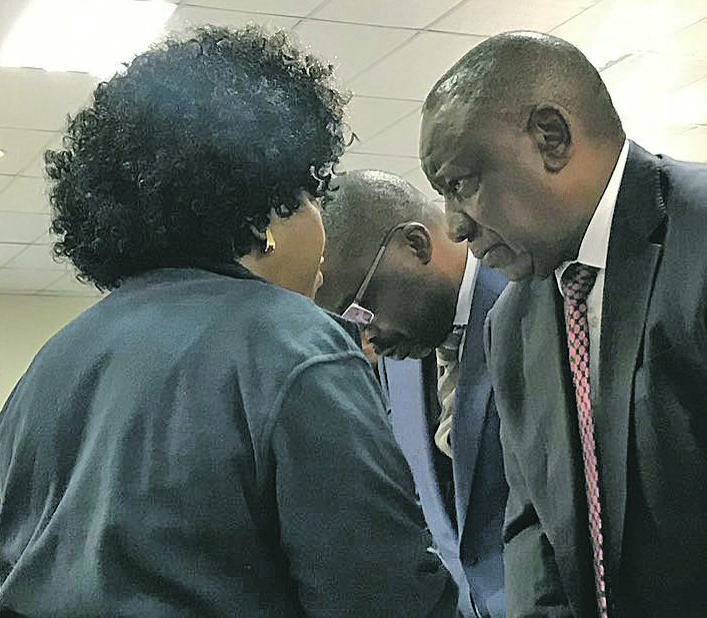
Calls for President Cyril Ramaphosa to release a woman sentenced to life imprisonment for killing her husband reverberated around the conference room at Saint George Hotel in Pretoria on Thursday, on day one of the two-day national summit against gender-based violence and femicide.
The event, hosted by the government, was attended by various stakeholders, including business leaders, academics, civil society organisations and faith-based organisations.
The calls for the woman’s release were made by gender-based violence activists.
They wanted Ramaphosa and Justice and Correctional Services Minister Michael Masutha to set 57-year-old Martha Libuseng Marumo free.
Marumo is serving a life sentence at Kgosi Mampuru prison in Pretoria for killing her abusive husband in 2003.
Marumo became a heroic figure for survivors and activists at the summit, which ended on Friday. The summit was announced by Ramaphosa at the national Women’s Day celebrations in August, following the #TotalShutdown women’s march to the Union Buildings earlier that month.
Dressed in her blue inmate trousers and a blue jacket, Marumo sat quietly at a table of panelists in front of 1 000 delegates.
She was flanked by other survivors and by representatives of civil society organisations.
Marumo said she killed her husband because he was abusive and had been cheating on her.
She said he refused to use a condom when he had sex with her. “He was sleeping with different women, using his car as a bedroom.”
Marumo turned to her husband’s family for help, to no avail. His uncle threatened that if she continued to demand that he wear a condom, her husband would “do something to her”.
Marumo said she tried to seek help from the police and a counselling organisation for the abuse she was suffering, but they did nothing to help. Her only option was to kill him, she said – to loud applause from the activists.
She responded to the applause by saying that she was not advocating that partners murder their abusive spouses.
“When I was sentenced, my last born was four years old. Now she is 19 and keeps on asking: ‘Mommy, when are you coming home?’” she said, before being taken back to prison by correctional services officers.
Correctional services spokesperson Singabakho Nxumalo said Marumo was a rehabilitated offender who, in addition to her higher education diploma, had taken part in several programmes, including ones on life skills, anger management and restorative justice. He said Marumo had already served 13 years, adding that life sentence inmates could only be considered for parole after spending 25 years in jail. “She falls into that category,” Nxumalo said.
Former president Nelson Mandela’s granddaughter, Ndileka Mandela, who attended the summit, said listening to survivors’ harrowing experiences broke her heart, adding that some stories showed that the abusers knew they wouldn’t face consequences.
One story that affected her was told by Avela (25), who saw her pregnant mother raped and killed. The murderer was never apprehended and Avela was left to fend for herself and her sibling.
“I was sobbing, thinking to myself: ‘How can someone do something like that to another person?’” Mandela said.
Another story was of a woman who was raped, and nurses at a nearby hospital refused to give her preventive HIV/Aids treatment because she was from Zimbabwe. “How do you do that to a person and brutalise her again?” asked Mandela.
Addressing the audience on Friday, Ramaphosa said government had heeded the demands made by women during the #TotalShutdown march in August, and had agreed to a demand to review national plans to end gender-based violence.
He said there was a need to also examine the possibility of introducing a national registry of protection orders to protect women who had moved to different areas in the country.
Ramaphosa said the violence was a crisis that was tearing our society apart.
“We must seriously re-examine how we talk about violence against women and children, and how our discourse reflects societal norms. It is extremely distressing to hear ordinary South Africans question why a parent would let a child play by herself after a six-year-old was recently raped at a well-known restaurant,” he said.
“The degree of victim-blaming evident in this statement is appalling. We find similar, or worse, victim-blaming in statements such as: ‘Why does she stay with him if he beats her?’ or ‘Why did she wear a miniskirt to the taxi rank?’ or ‘How drunk was she?’
“The language we use too often places the responsibility on the victim to not be raped or hit, instead of placing the blame where it belongs: on the perpetrator.”
Ramaphosa said the country had high levels of violence and criminality, and cited recent data from the World Health Organisation showing that in South Africa, the femicide rate averaged 12.1 per 100 000 in 2016.
“This was almost five times higher than the global average of 2.6 per 100 000,” he said.
According to the police crime statistics released in September, femicide increased by 11% over the past two years. In addition, Stats SA reported that 138 per 100 000 women were raped last year – the highest rate in the world.
“We cannot, and we will not, rest until we have brought those figures down to zero … We want to eradicate [gender-based violence],” Ramaphosa said.




 Publications
Publications
 Partners
Partners








